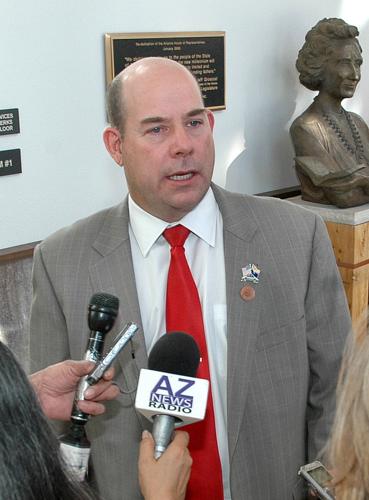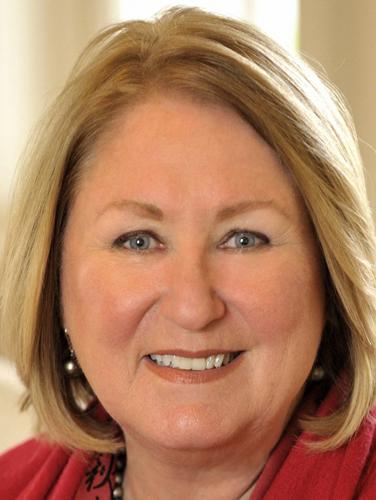The speakership of Southern Arizona Rep. David Gowan has gone from hopeful to disappointing to a full-on fiasco.
When he assumed the role last year, Gowan, a Republican from Sierra Vista whose district touches eastern Tucson, was the first speaker of Arizona’s House of Representatives from Southern Arizona since 1988.
While he was known as a courteous overseer of the chamber in his first term, he did not bring any particular benefits to Southern Arizona, declining even to defend his alma mater, the University of Arizona, from budget cuts.
This year, controversy after controversy has dogged Gowan, culminating in Thursday’s shameful climax. His office demanded this week that the reporters who have badges allowing them onto the House floor go through an extensive background check or be expelled from the floor. They chose not to accept the new requirement and were banished to the gallery, as Howard Fischer of Capitol Media Services reported.
It was all for security reasons, Gowan and some of his Republican colleagues insisted. They needed to be sure the reporters on the floor didn’t pose a danger.
Let’s not put too fine a point on it: That justification is complete bull.
By restricting journalists in the name of suddenly urgent “security” concerns, Gowan was treading a path broken by dictators like Vladimir Putin in Russia and Tayyip Erdogan in Turkey. If they don’t like what someone is reporting, they declare the journalist a “terrorist” or the outlet a security risk, and shut them down.
In Gowan’s case, the target was plainly obvious: Hank Stephenson, a reporter who covers the House for the Arizona Capitol Times. Stephenson had the temerity in January to uncover the unethical use of cars from the state fleet by Gowan and other House members.
Although those cars are “for official use only,” Stephenson reported, Gowan and other House members had begun under his speakership to use them for all sorts of unofficial business on the taxpayers’ dime.
Gowan, who went on a campaign trip in a state car, ended up paying back $12,000 to the state and asking the Attorney General’s Office to investigate his actions. That rankled, of course, and Stephenson has continued his tough reporting.
Although Democrats in the House filed an ethics complaint against Gowan and others who appeared to have abused state-car privileges, Rep. David Stevens, the chair of the House ethics committee, declined to investigate. Stevens, by the way, is Gowan’s friend and seatmate from Sierra Vista, appointed to the chairmanship by the speaker.
This week, Stephenson posted on Twitter, the social media site, a photo of a television screen showing the Arizona Diamondbacks opening-night game: Behind a batter, there was Gowan, sitting next to Arizona Diamondbacks co-owner Mike Ingram in the front row.
That’s significant for a couple of reasons. Most importantly, Ingram is chairman of a company, El Dorado Holdings, trying to build a 28,000-home master-planned community west of Benson. Gowan is sponsoring a bill that would make it easier for El Dorado and other developers to get tax-exempt bond financing for building infrastructure in new projects like this one, which is in his legislative district.
(Gowan’s campaign said the speaker had held a fundraiser that night at a suite in the ballpark and just went down for a short period to visit with Ingram.)
The broader significance is that Gowan has become known as a speaker who indulges in the perks of his office, as I’ve detailed in previous columns. Being seen in front-row seats with a businessman whom Gowan is helping with legislation only reinforces that impression.
As Gowan cracks down on reporters, the Senate is actually making progress on its budget discussions, the Arizona Republic reported Thursday, but the House is muddling along. Perhaps it’s not surprising that Gowan’s chamber is going much slower this year than last: There is no benefit to the speaker to go fast.
Gowan’s time in the Legislature ends with the close of this session. When that happens, Gowan’s power will evaporate. Though he is running for Congress in District 1, he doesn’t have the political skill or broad base of support to take the next step without the leverage of his position.
So I expect the session to drag out, and Southern Arizona’s embarrassment to continue.
Union’s Trump endorsement
When the National Border Patrol Council made an unprecedented presidential endorsement last week, it was surprising … but not really. The council, which represents thousands of agents in Southern Arizona, endorsed Donald Trump for president, the union’s first-ever endorsement in the primary season. That’s why it was surprising.
Trump speaks the same language as the union — one of overwhelming crisis on the border — and of the need for heroic, manly efforts to stop it. In its endorsement, the union spoke of the need of a “pro-America” president who seals the border “before it is too late.” That got an eyeroll from the New York Times editorial board this week.
What I f ind disturbing is the degree to which the union seems to have bought the entire Trump line, not just his position on border issues, which is understandably appealing to some agents. It parrots Trump’s claim to be beholden to no one, of others “betraying this country” and of him being “bold and outspoken.” By falling for him so completely, it puts its credibility at risk not just with Americans, but also with the agents who aren’t so credulous.
Hart loses key support
First, Rep. Macario Saldate called in the Star for UA President Ann Weaver Hart to resign either her position with the UA or her new job on the board of DeVry Education Group. When she didn’t, 22 legislators sent a letter asking for her to quit her UA post.
This was even more significant than it sounds. That’s because these are officials, many from Pima County, who can be counted on to make the strongest case for the university at the Legislature. In a time of state budget cuts, the university needs these people more than ever. And Hart has lost them.
Tough matchup for JP
Justice of the peace is not one of those offices that usually stir up big-name contests. This year, though, there’s a heavyweight battle in a district that encompasses part of central Tucson and the northwest side.
On Feb. 5, Jeff Rogers, the former chairman of the Pima County Democratic Party, filed to run for the office in Precinct 6. He was joined March 4 by Paula Aboud, a former state senator. The two are vying to replace JP Paul Simon, who is retiring.









